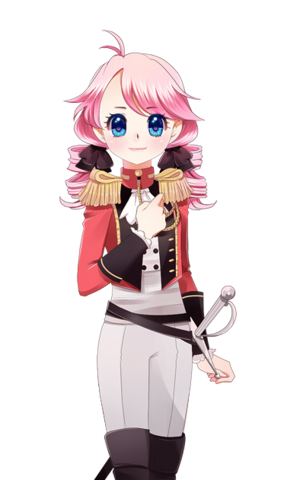
The Uniform, the outfit unlocked by these skills.
Military is a category of skills that cover understanding of land strategy, naval strategy, and military logistics.
Studying it unlocks the Uniform outfit when you have 25 in each of the category's three skills. The Uniform adds 10 points to each Military sub-skill when worn.
Weekend Activities Unlocked[]
- Tour the Barracks: Requires Strategy >40
Mood Variables[]
Military skills training is increased by the Willful and Angry moods and penalized by the Afraid and Cheerful moods.
| Afraid
-1 |
Cheerful
-2 |
Willful
+1 |
Pressured
0 |
| Angry
+1 |
Depressed
0 |
Yielding
0 |
Lonely
0 |
Strategy[]
| Points | Description |
|---|---|
| 10 | You study the strengths and weaknesses of different weapons in battle formations. |
| 20 | You study the effects of battle stress on troops, and how morale can turn the tide of battle. |
| 30 | You study military recruitment and the importance of training and motivation in making soldiers who can trust and depend on each other. |
| 40 | You learn about how units reinforce each other in the field, gaining strength through proximity and the covering of weaknesses. |
| 50 | You study the effects of different kinds of battle terrain for both offense and defense. |
| 60 | You study the power of ranged weapons, from arrows to thrown fire and sand, and how the threat of such attacks can shift the enemy's response. |
| 70 | You study the use of cavalry in battle, as well as the costs and benefits of traveling with large animals. |
| 80 | You study the effects of a strong hierachy on military organisation and the ability of troops to respond to changing situations. Communication across an army can be difficult; disrupted signals can lead to chaos. |
| 90 | You study famous battles: the disasters and the mistakes which created them, and the turning points in larger conflicts and why they made a difference. |
| 100 | You study the concept of "defeat in detail" and how an army can be destroyed by crushing small parts one at a time rather than attacking it all at once. |
[]
| Points | Description |
|---|---|
| 10 | You learn that the sea is not something you hold, it is something you travel across. Naval strategy ensures your free travel while denying it to your enemies. |
| 20 | You study different kinds of ships - their names, designs, and the number of crew needed for each. |
| 30 | You study different kinds of ships - their speed, maneuverability, and standard complement of weapons. |
| 40 | You learn about the requirement for all civilized sailors to rescue the crew of a sinking ship, even an enemy. |
| 50 | You learn about the challenges to naval warfare posed by unpredictable weather, as well as the dangers of sailing too close to an unknown coastline. |
| 60 | You learn about the use of ships in transporting ground soldiers between locations. |
| 70 | You study the cost, time, and materials required to construct new ships. |
| 80 | You study blockades, both setting them and breaking them. |
| 90 | You study the effect of cannons against coastal installations such as enemy docks and seaside villages. |
| 100 | You study the difficulty of a sneak attack at sea, and ways that it can be achieved. |
Logistics[]
| Points | Description |
|---|---|
| 10 | You learn about the types and amounts of food required for an army on the march, and how long they will remain edible. |
| 20 | You study the kinds of equipment that soldiers need available, such as bedding, weapons, armor, medicine, bandages, and the tools to repair anything damaged. |
| 30 | You study different kinds of transport - animals, wagons, sledges, ships, boats, and boots. |
| 40 | You learn about the support costs created by support - the more equipment you have, the more people and animals are needed to move them, and then those people and animals also need to be fed and equipped. |
| 50 | You learn about the difficulties of obtaining new supplies from the field. Enemy civilians may hide or destroy supplies rather than let them fall into your hands, and friendly civilians may not stay friendly if robbed. |
| 60 | You study how to determine when to jettison or destroy excess goods for speed, and how to avoid overreaching. |
| 70 | You learn about how to calculate enemy war preparations based on the movement of goods within their lands. Armies do not spring up full-formed overnight. |
| 80 | You study the benefits for looting as a troop motivator versus the negative effect on civilian populations. |
| 90 | You learn how to calculate how effective military strength wanes over distance from a 'home' position, as it becomes more difficult to put pieces into play. |
| 100 | You learn how to delay the advance of an invading force by disrupting their transport and communications. |
